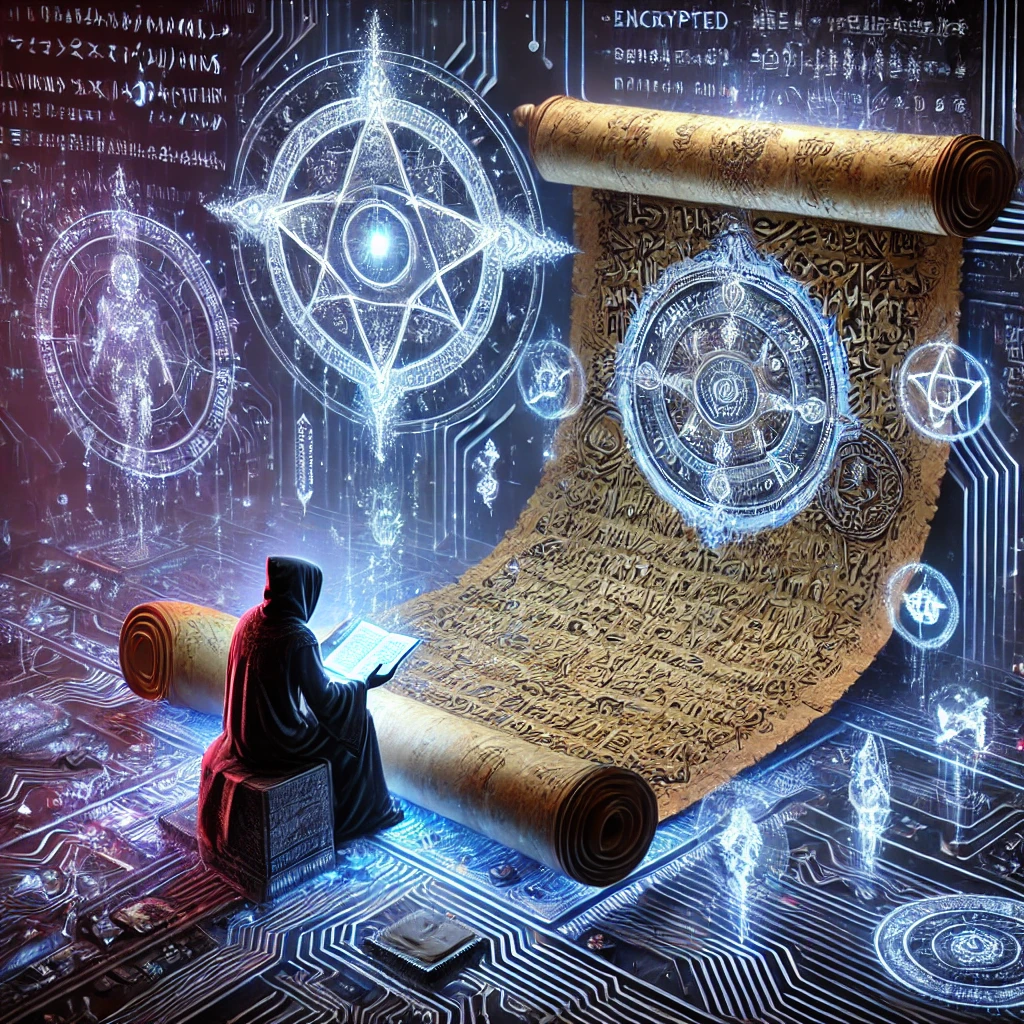EncryptedScroll - Reverse Engineering Writeup
Challenge Description
Elowen Moonsong, an Elven mage of great wisdom, has discovered an ancient scroll rumored to contain the location of The Dragon's Heart. However, the scroll is enchanted with an old magical cipher, preventing Elowen from reading it.
Initial Analysis
I started by examining the binary with objdump to get the disassembly and extracted strings using the strings command to get an initial understanding of the program.
$ objdump -d challenge > output.txt
$ strings challenge > strings.txt
Looking at the strings output, I found some interesting text:
The scroll detects prying eyes... The magic dissipates.
___________________________
/ \
| **Ancient Elven Scroll** |
|-----------------------------|
| The knowledge you seek is |
| hidden within the old runes|
| of the Elven mages... |
| Speak the words of power. |
\_____________________________/
The Dragon's Heart is hidden beneath the Eternal Flame in Eldoria.
The scroll remains unreadable... Try again.
The ancient scroll hums with magical energy. Enter the mage's spell:
This confirmed that I need to find the correct password ("spell") to reveal the location of The Dragon's Heart.
Disassembly Analysis
Looking at the disassembly, I identified three main functions:
anti_debug: Prevents debuggingdisplay_scroll: Shows the ASCII art scrolldecrypt_message: Verifies the password and reveals the secret
Anti-Debug Protection
The anti_debug function uses the ptrace syscall to detect if the program is being debugged:
00000000000011a9 <anti_debug>:
11a9: 55 push %rbp
11a2: bf 00 00 00 00 mov $0x0,%edi
11c1: b8 00 00 00 00 mov $0x0,%eax
11c6: e8 b5 fe ff ff call 1080 <ptrace@plt>
If a debugger is attached, it prints a message and exits:
11d1: 48 8d 05 30 0e 00 00 lea 0xe30(%rip),%rax
11d8: 48 89 c7 mov %rax,%rdi
11db: e8 60 fe ff ff call 1040 <puts@plt>
11e0: bf 01 00 00 00 mov $0x1,%edi
11e5: e8 b6 fe ff ff call 10a0 <exit@plt>
Password Verification
The core of the challenge lies in the decrypt_message function, which contains the encrypted password that needs to be decrypted:
12aa: 48 b8 49 55 43 7c 74 movabs $0x716e32747c435549,%rax
12b1: 32 6e 71
12b4: 48 ba 6d 34 60 67 6d movabs $0x6068356d6760346d,%rdx
12bb: 35 68 60
12c6: 48 b8 6d 35 68 60 35 movabs $0x753273356068356d,%rax
12cd: 73 32 75
12d0: 48 ba 69 6e 34 75 32 movabs $0x7e643275346e69,%rdx
12d7: 64 7e 00
The decryption algorithm is straightforward:
12eb: 8b 45 cc mov -0x34(%rbp),%eax
12ee: 48 98 cltq
12f0: 0f b6 44 05 d0 movzbl -0x30(%rbp,%rax,1),%eax
12f5: 83 e8 01 sub $0x1,%eax
It simply subtracts 1 from each byte of the encrypted string.
Decryption Process
I need to carefully extract the encrypted bytes, accounting for x86-64's little-endian byte ordering. The bytes are loaded into memory with movabs instructions and stored sequentially.
The byte sequences from the movabs instructions:
0x716e32747c4355490x6068356d6760346d0x753273356068356d0x7e643275346e69
Due to little-endian ordering, I need to reverse each 8-byte chunk:
1. 49 55 43 7c 74 32 6e 71 → 71 6e 32 74 7c 43 55 49
2. 6d 34 60 67 6d 35 68 60 → 60 68 35 6d 67 60 34 6d
3. 6d 35 68 60 35 73 32 75 → 75 32 73 35 60 68 35 6d
4. 69 6e 34 75 32 64 7e 00 → 00 7e 64 32 75 34 6e 69
To decrypt, I subtract 1 from each byte:
71 → 70: p 6e → 6d: m 32 → 31: 1 74 → 73: s 7c → 7b: { 43 → 42: B 55 → 54: T 49 → 48: H
60 → 5f: _ 68 → 67: g 35 → 34: 4 6d → 6c: l 67 → 66: f 60 → 5f: _ 34 → 33: 3 6d → 6c: l
75 → 74: t 32 → 31: 1 73 → 72: r 35 → 34: 4 60 → 5f: _ 68 → 67: g 35 → 34: 4 6d → 6c: l
00 → 00: NULL 7e → 7d: } 64 → 63: c 32 → 31: 1 75 → 74: t 34 → 33: 3 6e → 6d: m 69 → 68: h
Now, reading from right to left (because of little-endian) and top to bottom: HTB{s1mpl3_fl4g_4r1thm3t1c}
Solution
When the program prompts "The ancient scroll hums with magical energy. Enter the mage's spell:", I enter the decrypted password:
HTB{s1mpl3_fl4g_4r1thm3t1c}
The program then reveals the hidden message: "The Dragon's Heart is hidden beneath the Eternal Flame in Eldoria."
Flag
HTB{s1mpl3_fl4g_4r1thm3t1c}
Summary
This challenge required reverse engineering a binary to understand its password verification mechanism. The program used a simple substitution cipher (subtracting 1 from each byte) to encrypt the password. By carefully analyzing the assembly code and accounting for little-endian byte ordering, I was able to recover the original password and solve the challenge.
